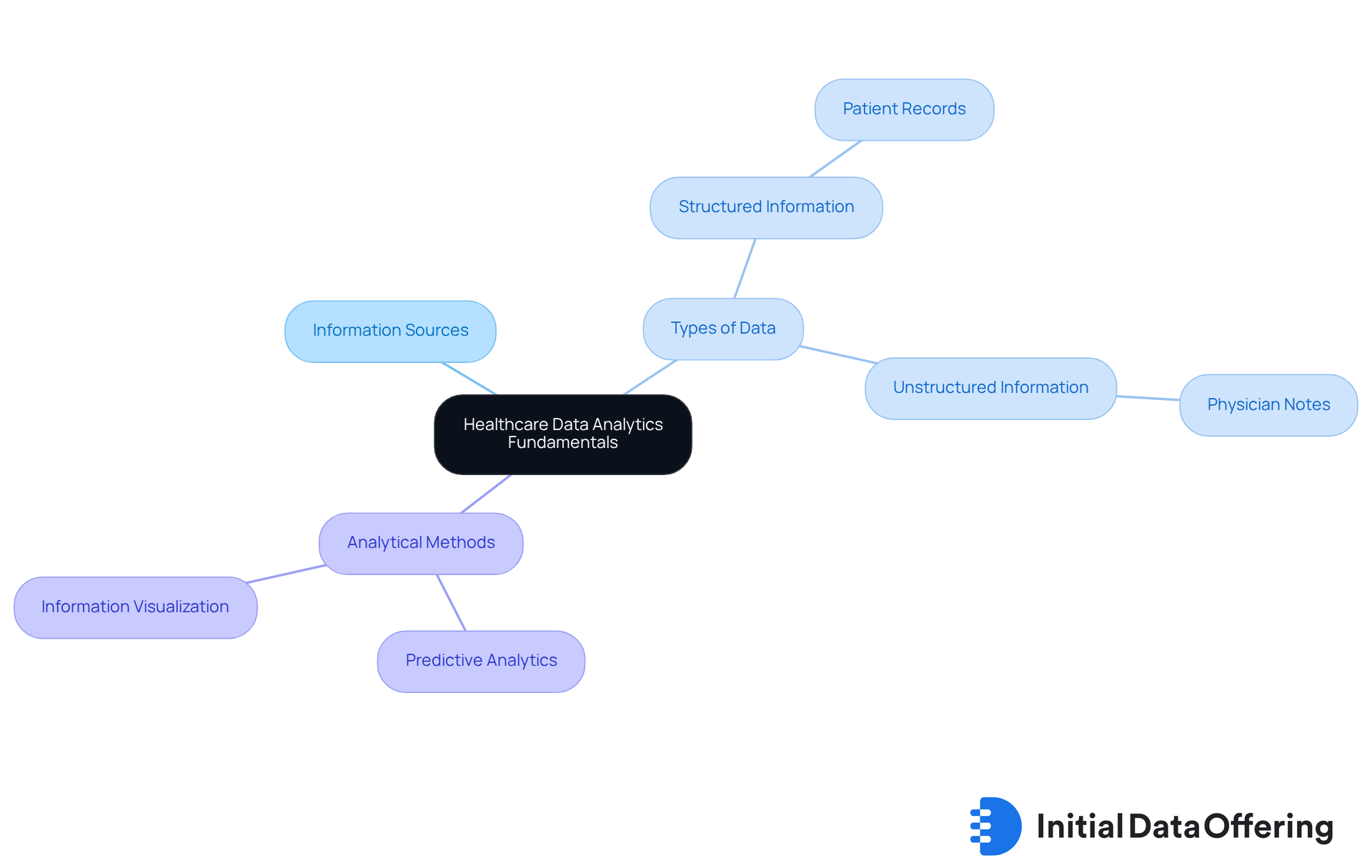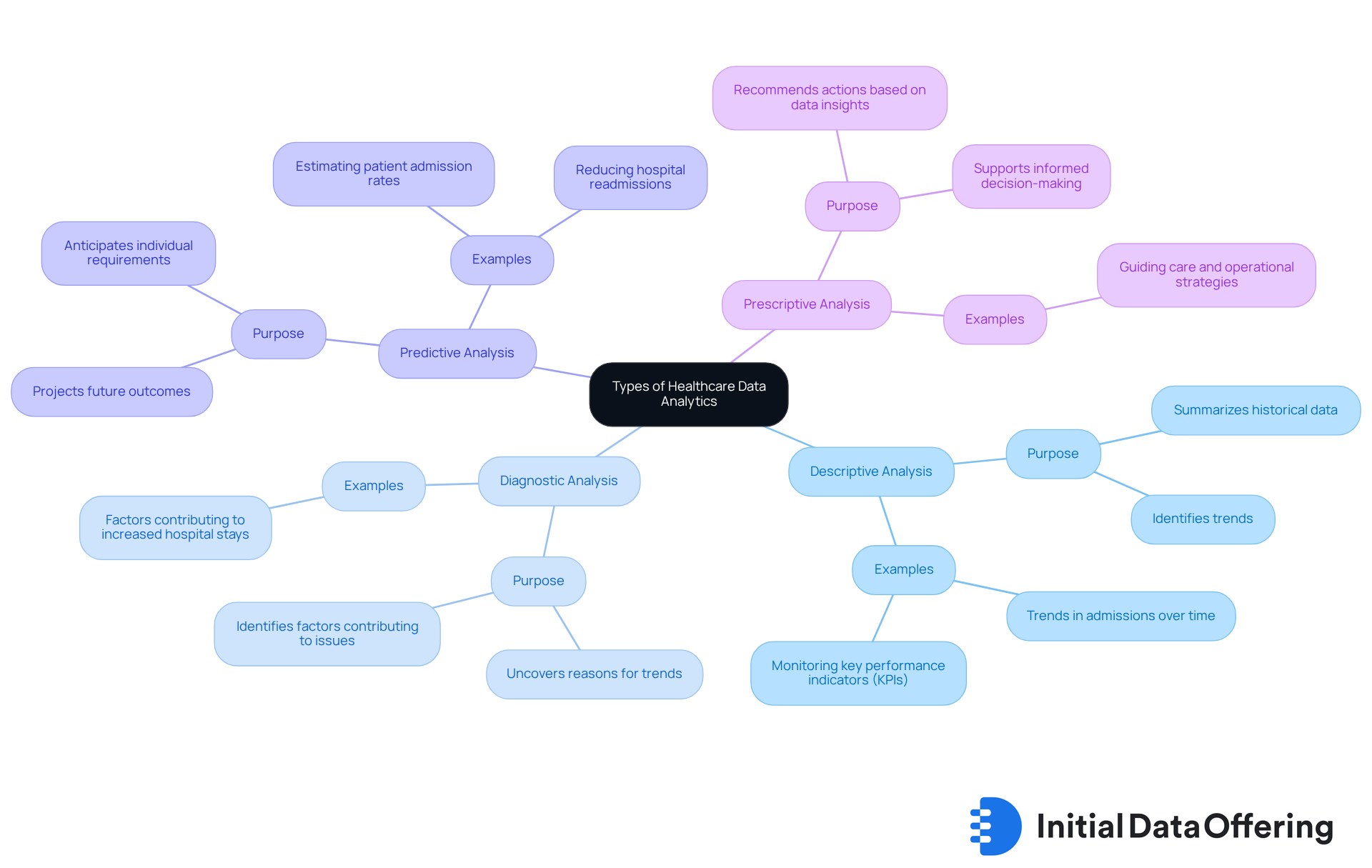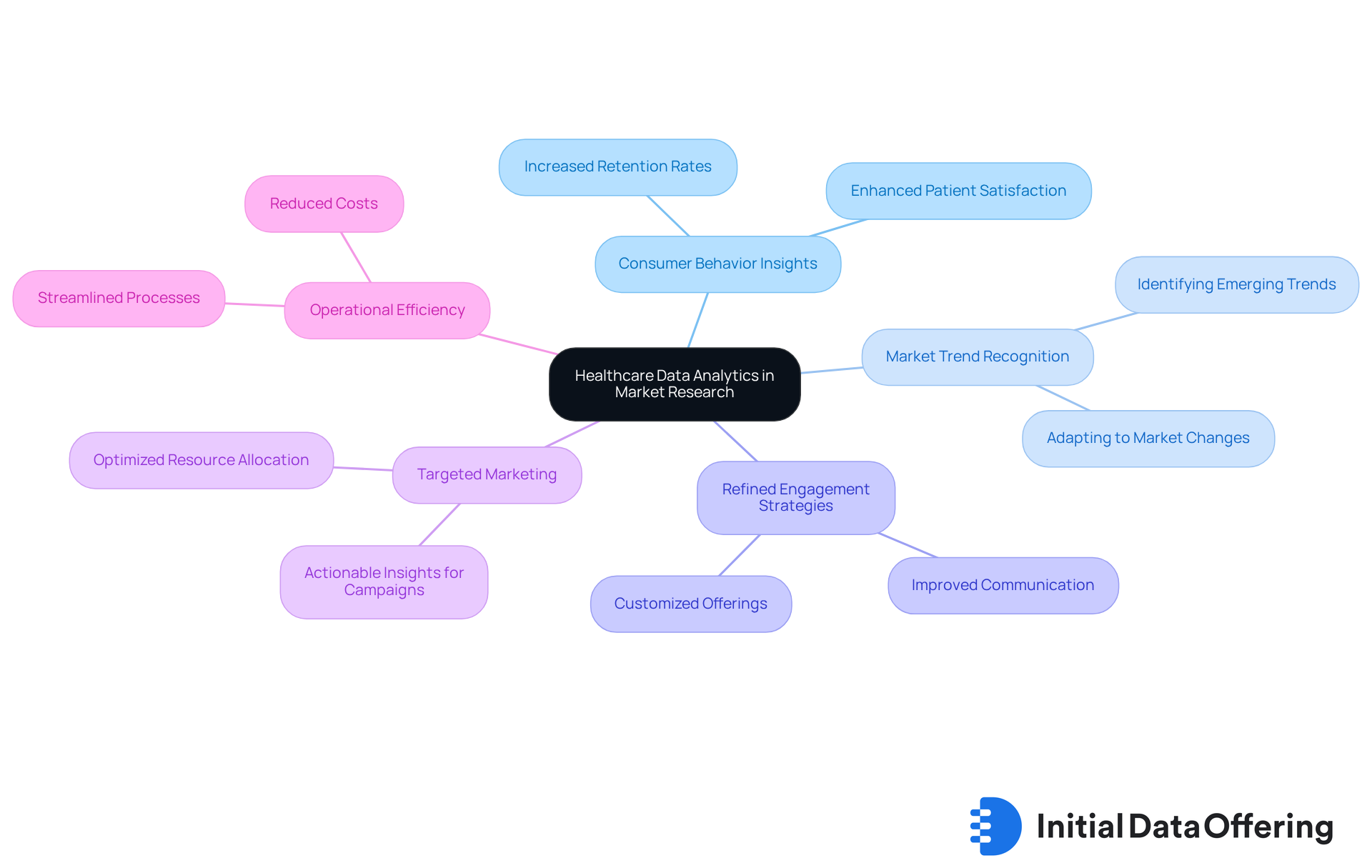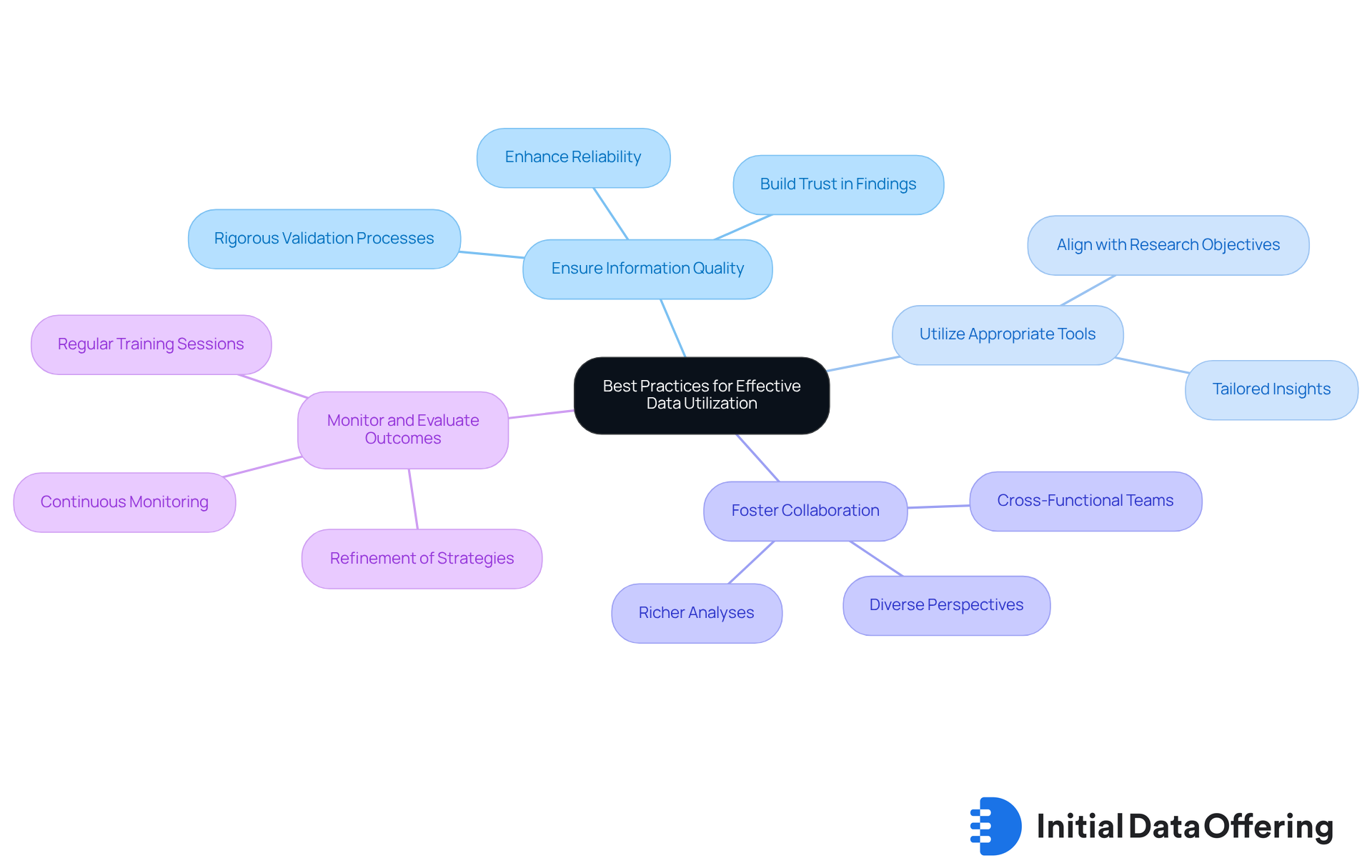Master Healthcare Data Analytics: Best Practices for Market Research

Master Healthcare Data Analytics: Best Practices for Market Research
Overview
Mastering healthcare data analytics is crucial for professionals aiming to enhance market research and decision-making. Understanding various types of data—both structured and unstructured—along with analytical methods, forms the foundation of effective research. By leveraging these data types, researchers can uncover valuable insights that significantly improve patient outcomes and operational efficiency in the healthcare sector.
The advantages of utilizing high-quality data are clear: it leads to informed decisions that can transform healthcare practices. For instance, when researchers collaborate effectively, they can ensure data quality, which in turn enhances the reliability of their findings. This collaboration not only fosters a culture of continuous improvement but also drives innovation in patient care.
Ultimately, the benefits of mastering healthcare data analytics extend beyond mere insights; they empower healthcare professionals to implement strategies that can lead to better health outcomes and optimized operations. How can you apply these insights in your own work to drive improvements? By considering the implications of data analytics, you can contribute to a more efficient and effective healthcare system.
Introduction
The healthcare landscape is increasingly driven by data, with analytics playing a pivotal role in shaping effective market research strategies. By mastering healthcare data analytics, professionals can unlock a treasure trove of insights that inform decision-making and enhance patient outcomes and operational efficiency. However, as the volume and complexity of healthcare data continue to grow, organizations face the challenge of navigating this intricate terrain to harness its full potential.
Exploring best practices in healthcare data analytics reveals critical strategies that empower market researchers to thrive in this dynamic environment. These practices not only highlight the features of data analytics but also showcase their advantages, such as improved accuracy in research and the ability to make informed decisions. Ultimately, the benefits extend beyond organizational efficiency; they significantly impact patient care and outcomes.
How can organizations effectively leverage these insights? By adopting a strategic approach to data analytics, professionals can enhance their market research efforts, ensuring they remain competitive in an ever-evolving healthcare landscape.
Understand Healthcare Data Analytics Fundamentals
Healthcare data analysis involves a systematic examination of healthcare data, generating actionable insights that guide decision-making. This process encompasses several key elements, including an understanding of information sources, types, and analytical methods. For instance, familiarity with concepts such as structured versus unstructured information, predictive analytics, and information visualization is essential. Structured information, such as patient records, provides a clear dataset, while unstructured information, like physician notes, offers rich context.
By grasping these fundamentals, market researchers can effectively evaluate the landscape of healthcare information and its implications for their studies. The ability to differentiate between these information types not only enhances data analysis but also facilitates informed decision-making. How can these insights shape your approach to healthcare research? Understanding the nuances of healthcare information can significantly impact the strategies employed in your studies, leading to more effective outcomes.
In summary, a comprehensive understanding of healthcare information analysis is vital for professionals in the field. By leveraging structured and unstructured healthcare data, researchers can uncover valuable insights that drive impactful decisions. As you navigate this complex landscape, consider how these analytical methods can enhance your research and contribute to better healthcare outcomes.

Explore Types of Healthcare Data Analytics
The analysis of healthcare data encompasses four primary categories: descriptive, diagnostic, predictive, and prescriptive methods. Descriptive analysis serves to summarize historical data, thereby identifying trends and providing a foundational understanding of past performance. For instance, it can reveal trends in admissions over time, which assists organizations in monitoring key performance indicators (KPIs).
In contrast, diagnostic analysis delves deeper, aiming to uncover the underlying reasons for these trends. This might involve identifying factors contributing to increased hospital stays, thus providing valuable insights for improvement. Predictive analysis, on the other hand, employs statistical models to project future outcomes, enabling medical providers to anticipate individual requirements. Market researchers, for example, can use predictive analysis to estimate patient admission rates, guiding resource allocation strategies and staffing needs. This proactive approach is essential for effective healthcare resource management, particularly as the U.S. telehealth market was valued at USD 29.6 billion in 2022 and is projected to grow at a compound annual growth rate (CAGR) of 22.9% from 2023 to 2030. Furthermore, predictive analysis is crucial in reducing hospital readmissions, thus enhancing resource management.
Ultimately, prescriptive analysis takes the process a step further by recommending actions based on data insights. This analysis can support medical teams in making informed decisions regarding care and operational strategies. By integrating these various data types, medical organizations can improve decision-making processes, enhance patient outcomes, and optimize operational efficiency, ultimately driving better service delivery. It is also noteworthy that 67% of medical organizations report their inability to efficiently assess information as their greatest challenge in enhancing client outcomes. This statistic underscores the pressing need for robust analytical solutions within the sector.

Leverage Benefits of Healthcare Data Analytics in Market Research
The analysis of healthcare data offers significant advantages in market research, allowing organizations to uncover profound insights into consumer behavior, recognize market trends, and refine engagement strategies. By meticulously examining feedback data from patients receiving care, service providers can customize their offerings to align more closely with expectations. This tailored approach not only enhances patient satisfaction but also boosts retention rates.
Furthermore, leveraging data analysis facilitates the development of targeted marketing strategies. Companies can enhance their outreach efforts based on actionable, data-driven insights. This methodology not only fosters increased patient involvement but also cultivates a more adaptable healthcare environment. Ultimately, these improvements lead to better health outcomes and greater operational efficiency.
How can your organization benefit from these insights? By embracing healthcare data analysis, you position yourself to respond effectively to evolving consumer needs, ensuring that your services remain relevant and impactful.

Implement Best Practices for Effective Data Utilization
To effectively utilize healthcare data analytics, market researchers should adopt several best practices.
- Ensuring information quality is paramount; this can be achieved by implementing rigorous validation processes. This feature not only enhances the reliability of the data but also builds trust in the findings.
- Utilizing appropriate analytical tools and software that align with research objectives is essential. These tools provide the advantage of tailored insights that directly support the goals of the research.
- Fostering collaboration among cross-functional teams can significantly enhance interpretation. When diverse perspectives come together, the benefits include richer analyses and more comprehensive conclusions.
- Lastly, continuously monitoring and evaluating analytics outcomes allows for the refinement of strategies, ensuring they remain effective and relevant.
For example, a healthcare organization might implement regular training sessions for staff on healthcare data interpretation, which would improve overall analytical capabilities and empower teams to make informed decisions.

Conclusion
Understanding and mastering healthcare data analytics is crucial for market researchers aiming to make informed decisions that enhance patient outcomes and operational efficiency. By delving into the fundamentals of data types and analytical methods, researchers can harness the power of both structured and unstructured data to drive impactful insights. This foundational knowledge not only aids in evaluating the healthcare landscape but also shapes effective research strategies that can lead to improved healthcare delivery.
The article highlights the importance of various types of healthcare data analytics—descriptive, diagnostic, predictive, and prescriptive—each playing a unique role in uncovering trends, understanding underlying causes, forecasting future needs, and recommending actionable steps. By integrating these analytical approaches, healthcare organizations can optimize their decision-making processes and enhance patient care. Furthermore, the benefits of data analytics extend to market research, where understanding consumer behavior and market trends can refine engagement strategies and ultimately lead to better health outcomes.
Embracing best practices in healthcare data analytics is essential for researchers to fully leverage these insights. Ensuring data quality, utilizing the right tools, fostering collaboration, and continuously evaluating outcomes are all critical steps in this journey. As the healthcare landscape evolves, organizations must remain agile and responsive to consumer needs, making data analytics not just a tool but a vital component of strategic planning. By prioritizing effective data utilization, researchers can play a pivotal role in shaping the future of healthcare delivery and ensuring that services remain relevant and impactful.
Frequently Asked Questions
What is healthcare data analytics?
Healthcare data analytics involves systematically examining healthcare data to generate actionable insights that guide decision-making.
What are the key elements of healthcare data analysis?
Key elements include understanding information sources, types, and analytical methods, such as structured versus unstructured information, predictive analytics, and information visualization.
What is the difference between structured and unstructured information in healthcare?
Structured information, like patient records, provides a clear dataset, while unstructured information, such as physician notes, offers rich context that can enhance understanding.
How does understanding healthcare data analytics benefit market researchers?
By grasping the fundamentals of healthcare information, market researchers can effectively evaluate the landscape of healthcare data and make informed decisions that impact their studies.
Why is it important to differentiate between information types in healthcare data analysis?
Differentiating between information types enhances data analysis and facilitates informed decision-making, leading to more effective research outcomes.
How can insights from healthcare data analytics shape research strategies?
Understanding the nuances of healthcare information can significantly impact the strategies employed in research, resulting in more effective outcomes.
What is the overall significance of healthcare information analysis for professionals in the field?
A comprehensive understanding of healthcare information analysis is vital for professionals, as it enables them to leverage both structured and unstructured data to uncover valuable insights that drive impactful decisions.